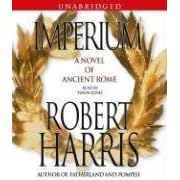By Mary Harrsch
Well, I just finished listening to "Imperium" by Robert Harris.  Once more, Harris delves into the inner workings of the Roman Empire only this time, he retreats back to the Republican era and creates a fictional biography of Marcus Tullius Cicero as seen through the eyes of his slave secreatary, Tiro.
Once more, Harris delves into the inner workings of the Roman Empire only this time, he retreats back to the Republican era and creates a fictional biography of Marcus Tullius Cicero as seen through the eyes of his slave secreatary, Tiro.
Since I was originally seduced into my passion for learning about the Roman Empire by Colleen McCullough and her "Masters of Rome" series of novels, I naturally began this investigation of the life of Cicero with misgivings since Cicero is less than heroic in McCullough's books that tend to present Julius Caesar as the more admirable character.
Harris does not really change that perception of Cicero so much as provide the context for his opposition to Caesar and his fated alliance with the optimates, the group of aristocrats who formed the core of the faction that opposed Caesar in the senate and eventually, the civil war.
However, despite the fact that Cicero was not a sympathetic protagonist, I came to admire his tenacity in the face of social discrimination. His efforts to joust legally and politically within a system heavily weighted in favor of the wealthy and powerful were equally commendable.
As a "new man" Cicero could not rely on a long established patrician heritage to ease his climb up the coursus honorum to the seat of consul, the ultimate imperium, or symbol of authority, in the empire. He was also not militarily inclined so he did not seek the traditional path to political power through conquest either. Instead, he chooses to rely on his keen perception of political strategy and oratory skill to fight his way to the top through the law courts and Roman courts were as rife with personal danger, both literally and politically, as they were with bribery. The obstacles Cicero faced extended to his personal life as well.
Married to an aristocratic wife, Terentia Varrones, Cicero often walked a thin line with his efforts to thwart the designs of rich governors who plundered provinces or attempted to bribe their way into office or out of trouble. She often berated him for alienating her own social class.
Terentia maintained control of a huge dowry that was probably the primary reason Cicero married her. But, Cicero had to request a loan from her through her business manager as if she was just another moneylender in the forum. At one point, he had to present his entire legal defense to her to convince her she would get her money's worth. In fact, Cicero's wife was so hard-nosed and autocratic, I was surprised when half way through the book she has a thirtieth birthday. I thought from her forceful behavior she must have been much older.
The confrontations in the courtroom, the senate and the frenzied voting pens of the Campus Martius provide as much tension as a Roman battlefield and Harris does a masterful job of peopling these scenes with memorable characters. He does not shy away from presenting Cicero's "warts" either.Cicero takes calculated risks to obtain his objectives but he is also a pragmatist and, like most politicians, must form and break alliances as opportunities present themselves. Although he prosecutes a corrupt governor early in his career to gain stature as Rome's preeminent advocate, Cicero later defends a corrupt governor to regain the favor of the moneyed classes as his year to run for consul approaches.I was unaware of how deep-seated an enemy Crassus was to Cicero, at least as presented by Harris. In fact, Crassus was presented with a vicious edge, more dangerous than simply a wealthy wannabe.
I also found it ironic that Pompey had little affection for Cicero either even though both were "new" men. Cicero aspired to become consul, but he seemed satisfied with the overall structure of the Roman Republic. He was appalled when Pompey pressured him to support Pompey's own attempt at wresting control of the empire from the aristocrats of the senate (years before the civil war with Caesar) with his campaign for the award of sweeping powers to eliminate an upsurge in pirate activity. It must have seemed hipocritical to Cicero later when Pompey and the optimates opposed Julius Caesar on the grounds that he was attempting to take sole control of the empire, although the book ended with Cicero's election to consul.
Another surprise was the villainous portrayal of Catalina as a violent, brute of a man who had openly murdered people who stood in his way. I had kind of come to admire Catalina as the misunderstood sometimes-rascal presented in Steven Saylor's Gordianus the Finder mystery, "Catalina's Riddle". Now I'm going to have to do more research of original sources to come to my own conclusion about this historical enigma.
I had also always assumed that the aristocrats opposition to Caesar's proposed land reforms was based on greed. In "Imperium" however, Harris makes a plausible case for the aristocrats' fear of absolute power that Caesar would gain through the patron-client relationships that would result from land redistribution.
Harris presents an absorbing study of politics and the culture of power in the late Roman Republic and I find "Imperium" to be a worthy successor to Harris' "Pompeii".

